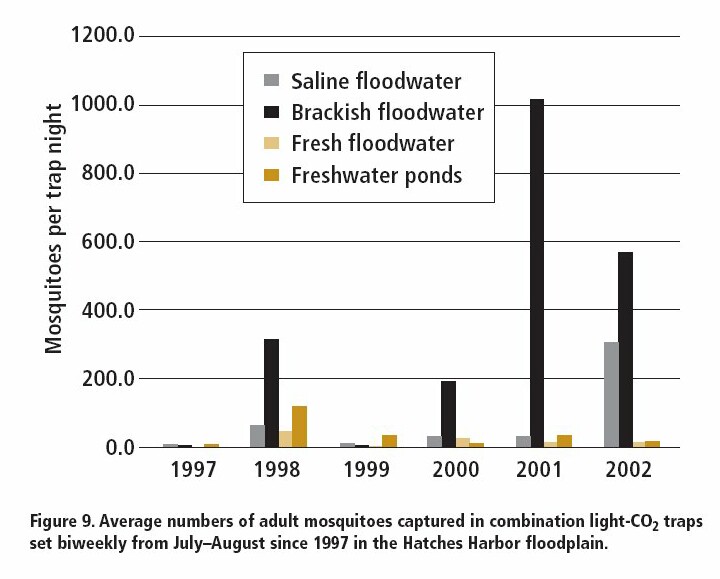 Two events have provided evidence that the conversion of the Herring River floodplain from a freshwater to a saltwater environment is likely to exacerbate the problem of nuisance mosquitoes.
Two events have provided evidence that the conversion of the Herring River floodplain from a freshwater to a saltwater environment is likely to exacerbate the problem of nuisance mosquitoes.
When the barrier sand dunes at Duck Harbor were breached by high tides and storm events in 2021, seawater overwash inundated the Duck Harbor basin. This new saltwater environment provided an ideal breeding environment for nuisance mosquitoes that thrive in brackish water. Here is what was reported in a January 2023 newspaper article:
Residents of Wellfleet still talk about the summer of 2021, when a mosquito boom in the suddenly-changed area made outdoor activities almost unbearable. "It's a horror movie," longtime Wellfleet resident Jodi North Birchall told the Cape Cod Times in July 2021, about the mosquito plague. "This is the worst I have ever seen."
Twenty-three years earlier (in 1998), the National Park Service initiated a tidal restoration project at Hatches Harbor in Provincetown. After evaluating its outcome for five years, the Park Service reported it as a prototype – The Hatches Harbor Prototype – for Cape Cod tidal restoration projects. Elevating the tides in Hatches Harbor caused an explosion of brackish and saline floodwater mosquito species (O. cantator and O. sollicitans), as shown in this graph. Wellfleet residents should hope that the Park Service would take these events into account when managing the Herring River Restoration Project. But the Park Service's record does not foster confidence. The owner of Duck Harbor (and nearly all the other territory impacted by the Herring River project) did not learn from the Hatches Harbor misstep. The Park Service did not preemptively deal with the predictable "mosquito boom" following the saltwater overwash at Duck Harbor in 2021, and the citizens of Wellfleet suffered.
Wellfleet residents should hope that the Park Service would take these events into account when managing the Herring River Restoration Project. But the Park Service's record does not foster confidence. The owner of Duck Harbor (and nearly all the other territory impacted by the Herring River project) did not learn from the Hatches Harbor misstep. The Park Service did not preemptively deal with the predictable "mosquito boom" following the saltwater overwash at Duck Harbor in 2021, and the citizens of Wellfleet suffered.
Return to Contrast
Top of page